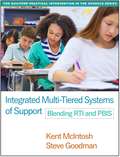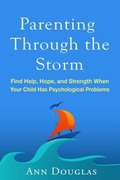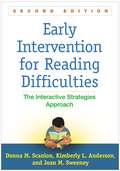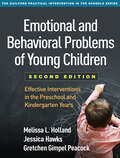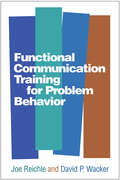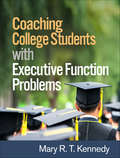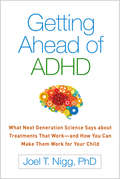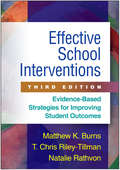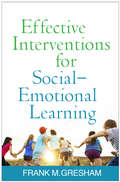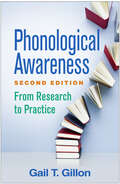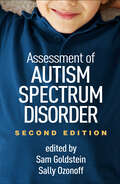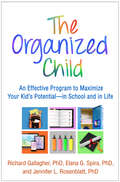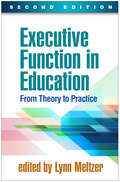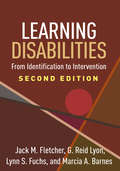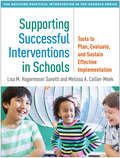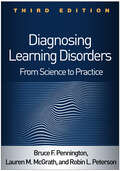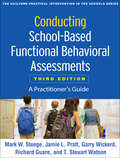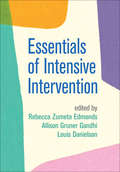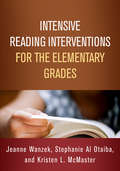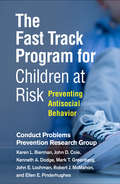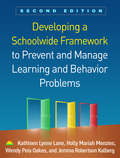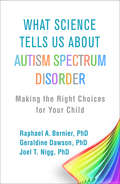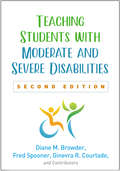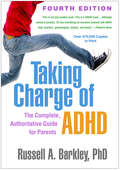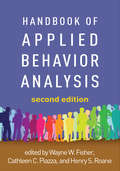- Table View
- List View
Integrated Multi-Tiered Systems Of Support: Blending Rti And Pbis (The Guilford Practical Intervention In The Schools)
by Kent McIntosh Steve GoodmanMany schools have implemented academic response to intervention (RTI) and schoolwide positive behavioral interventions and supports (PBIS) as separate initiatives. This book provides keys to making these programs more effective, seamless, efficient, and sustainable by combining them into a single multi-tiered system of support (MTSS). Steps and strategies are outlined for integrating data structures, practices, teams, and district systems. Contributing authors present detailed case examples of successful MTSS implementation in three states. In a large-size format with lay-flat binding, the book features 27 reproducible checklists and evaluation tools. Purchasers get access to a companion website where they can download and print the reproducible materials plus other helpful resources. <p><p> This book is in The Guilford Practical Intervention in the Schools Series, edited by T. Chris Riley-Tillman.
Parenting Through the Storm: Find Help, Hope, and Strength When Your Child Has Psychological Problems
by Ann DouglasRaising a child or teenager with a psychological condition is a "perfect storm" of stress, sadness, and uncertainty. How can you find the best treatments and help your child overcome emotional, behavioral, and academic challenges--while keeping yourself and your family strong? As a parent, you may feel isolated and alone, but the reality is that a lot of families are in the same boat. Ann Douglas knows firsthand just how daunting it can be. In this compassionate and empowering guide, she combines the vital lessons she has learned with vivid stories from other parents and advice from leading psychologists. Several record-keeping forms can be downloaded and printed for repeated use. The book cuts through the often-confusing clinical jargon and speaks from the heart about what matters most: the well-being of your child.
Early Intervention for Reading Difficulties: The Interactive Strategies Approach
by Donna Scanlon Kimberly Anderson Joan SweeneyGrounded in a strong evidence base, this indispensable practitioner guide and text has given thousands of teachers tools to support the literacy growth of beginning and struggling readers in grades K-2. The interactive strategies approach (ISA) is organized around core instructional goals related to enhancing word learning and comprehension of text. The book provides guidance for assessment and instruction in whole-class, small-group, and one-to-one settings, using the curricular materials teachers already have.
Emotional and Behavioral Problems of Young Children, Second Edition: Effective Interventions in the Preschool and Kindergarten Years
by Gretchen Gimpel Peacock Jessica Malmberg Melissa L. HollandPresenting interventions that are practical, effective, and easy to implement in educational and clinical settings, this book addresses the most frequently encountered emotional and behavioral problems in 3- to 6-year-olds. Strategies for collaborating with parents are emphasized. Practitioners are taken step by step through assessing and treating conduct problems, anxiety and other internalizing problems, toileting difficulties, picky eating and related concerns, and sleep problems. User-friendly features include 36 reproducible parent handouts, assessment forms, and other clinical tools; the print book has a large-size format with lay-flat binding for easy photocopying. Purchasers get access to a Web page where they can download and print the reproducible materials. This book is in The Guilford Practical Intervention in the Schools Series. New to This Edition *Reflects over a decade of research advances, plus new assessments and interventions. *Updated for DSM-5. *Chapter on intervention within a multi-tiered system of support (MTSS). *Chapter on referral procedures for complex problems. *Mindfulness techniques for both parents and children. *Cutting-edge ways to use acceptance and commitment therapy principles and motivational interviewing with parents. *23 new or revised reproducible tools.
Functional Communication Training for Problem Behavior
by David P. Wacker Joe ReichleChildren and adolescents with moderate and severe disabilities often have communication challenges that lead them to use problem behavior to convey their desires. This is the most comprehensive contemporary volume on functional communication training (FCT)--the individualized instructional approach that teaches a child socially acceptable communicative alternatives to aggression, tantrums, self-injury, and other unconventional behaviors. The expert authors provide accessible, empirically based guidelines for implementing FCT, and tips for overcoming obstacles. Grounded in the principles of applied behavior analysis, the book includes detailed strategies for developing a support plan, together with illustrative case examples.
Coaching College Students with Executive Function Problems
by Mary R. Kennedy Mckay Moore SohlbergAlthough executive function difficulties are often addressed in school-age children, there are few resources showing how to help these individuals when they are older. This book presents a dynamic coaching model that helps college students become self-regulated learners by improving their goal-setting, planning, time management, and organizational skills. Ideal for use with students with attention-deficit/hyperactivity disorder (ADHD), learning disabilities, acquired brain injury, and other challenges, Mary R. T. Kennedy's approach incorporates motivational interviewing and emphasizes practical problem solving. User-friendly features include numerous concrete examples, sample dialogues, and print and online resource listings. In a large-size format for easy photocopying, the book contains 21 reproducible forms. Purchasers get access to a Web page where they can download and print the reproducible materials for repeated use.
Getting Ahead of ADHD: What Next-Generation Science Says about Treatments That Work—and How You Can Make Them Work for Your Child
by Joel T. NiggDoes toxic pollution cause attention-deficit/hyperactivity disorder (ADHD)? What about screen use? Are alternative treatments worth exploring? Can dietary changes help? From leading ADHD researcher Joel T. Nigg, this book presents exciting treatment advances grounded in the new science of epigenetics--how genes and the environment interact. Distinguishing unsupported, even dangerous, approaches from bona fide breakthroughs, Dr. Nigg describes specific lifestyle changes that have been proven to support the developing brain. Vivid stories illustrate ways to maximize the positive effects of healthy nutrition, exercise, and sleep, and minimize the damage from stress and other known risk factors. The book helps you figure out which options hold the most promise for improving your child's symptoms and overall well-being--and gives you step-by-step suggestions for integrating them into daily life.
Effective School Interventions: Evidence-Based Strategies for Improving Student Outcomes
by Matthew K. Burns T. Chris Riley-Tillman Natalie RathvonThis indispensable course text and practitioner resource, now fully revised, has helped tens of thousands of readers implement evidence-based interventions to improve students' academic achievement and behavior in PreK–12. The volume presents best-practice guidelines and step-by-step procedures for 83 interventions that can easily be implemented by teachers and other school-based professionals. It is a go-to book for those working in a multi-tiered system of support (MTSS) or response-to-intervention (RTI) framework. User-friendly features include recommended print and online resources and 10 reproducible forms. Purchasers get access to a webpage where they can download and print the reproducible materials in a convenient 8 1/2" x 11" size. New to This Edition: *Updated throughout to reflect current research-based best practices. *20 new interventions. *Chapter on important skills for intervention success. *The intensity of each intervention (classwide, small-group, and/or individual) is now specified. *Behavior chapter has been reorganized for easier use. *Downloadable reproducible tools.
Effective Interventions for Social-Emotional Learning
by Frank M. GreshamThis book reviews evidence-based, multi-tiered practices for promoting social-emotional learning (SEL) with typically developing students as well as those with special needs. Leading authority Frank M. Gresham, codeveloper of the Social Skills Improvement System--Rating Scales, describes how to systematically assess K-12 students' social skills and plan and implement universal, selected, and intensive interventions. His approach is grounded in cutting-edge research on social-emotional competencies and their role in adjustment and academic achievement. Emphasizing what works, the book showcases programs and strategies that are sequenced, active, focused, and explicit. Detailed case examples and lesson plans illustrate different levels and types of SEL intervention. Reproducible assessment tools can be downloaded and printed in a convenient 8 1/2" x 11" size.
Phonological Awareness, Second Edition: From Research to Practice
by Gail T. GillonTranslating cutting-edge research into practical recommendations for assessment and instruction, this book has helped thousands of readers understand the key role of phonological awareness in the development of reading, writing, and spelling. It clearly shows how children's knowledge about the sound structure of spoken language contributes to literacy acquisition. Evidence-based strategies are described for enhancing all learners' phonological awareness and effectively supporting those who are struggling (ages 3–17). The book discusses ways to tailor instruction and intervention for a broad range of students, including English language learners (ELLs) and those with reading or language disorders. New to This Edition: *Incorporates over a decade of important advances in research, assessment, and instruction. *Chapter on ELLs, plus additional insights on ELLs woven throughout the book, including new case studies. *Chapter on spelling development. *Significantly revised coverage of children with complex communication needs.
Assessment of Autism Spectrum Disorder, Second Edition
by Sam Goldstein Sally OzonoffThis authoritative resource, now thoroughly revised for DSM-5, has set the standard for the comprehensive assessment of autism spectrum disorder (ASD). Leading experts demonstrate how to craft a scientifically grounded profile of each child’s strengths and difficulties, make a formal diagnosis, and use assessment data to guide individualized intervention in clinical and school settings. Chapters review state-of-the-art instruments and approaches for evaluating specific areas of impairment in ASD and co-occurring emotional and behavioral disorders. Considerations in working with children of different ages are highlighted. With a primary focus on children, several chapters also address assessment of adolescents and adults. New to This Edition *Chapter on key implications of DSM-5 diagnostic criteria, plus related updates throughout the volume. *Chapter on advances in early identification (ages 0–3). *Chapter with in-depth case examples illustrating the evaluation decision-making process and common diagnostic challenges. *Chapters on pseudoscience (including strategies for advising parents) and future directions in the field. *Current assessment data, numerous new and revised measures, and cutting-edge screening approaches.
The Organized Child: An Effective Program to Maximize Your Kid's Potential--in School and in Life
by Richard Gallagher Elana G. Spira Jennifer L. RosenblattAre you sick of nagging your child to write down homework assignments? Is his or her backpack a black hole that eats up papers, books, and gym clothes? Organizational skills problems aren't just frustrating--they get in the way of school success and wreak havoc at home. Fortunately, help is at hand. This unique resource stands out from other books because it is based on a scientifically tested program that works. Learn how you can teach your 7- to 13-year-old specific skills to: *Organize school materials and toys. *Track assignments. *Improve time management and planning. *Overcome brain "Glitches"--mischievous creatures that trip kids up. *Create and follow effective routines. Concrete examples, tips for strategically using praise and rewards, and practical tools (you can download and print additional copies as needed) help you implement each step of the program. Maximizing your kid's potential starts now--here's how. Mental health professionals, see also the related intervention manual from Gallagher et al., Organizational Skills Training for Children with ADHD: An Empirically Supported Treatment.
Executive Function in Education, Second Edition: From Theory to Practice
by Lynn MeltzerThis groundbreaking volume, now revised and updated, has given thousands of educators and clinicians a deeper understanding of executive function (EF) processes in typically developing children and those with learning difficulties and developmental disabilities. The book elucidates how PreK–12 students develop such key capacities as goal setting, organization, cognitive flexibility, working memory, and self-monitoring. Leading experts in education, neuroscience, and psychology explore the links between EF and academic performance and present practical applications for assessment and instruction. Exemplary practices for supporting students with EF difficulties in particular content areas--reading, writing, and math--are reviewed. New to This Edition *Expanded coverage of reading--chapters on recent fMRI research findings; working memory and reading; and self-regulation and reading comprehension. *Chapter on early childhood. *Chapter on embedding EF strategies in the curriculum *Updated throughout with a decade's worth of significant advances in research, theory, and educational best practices. See also Meltzer's authored book Promoting Executive Function in the Classroom, which provides easy-to-implement assessment tools, teaching techniques and activities, and planning aids.
Learning Disabilities, Second Edition: From Identification to Intervention
by Jack M. Fletcher G. Reid Lyon Lynn S. Fuchs Marcia A. BarnesReviewing the state of the science of learning disabilities (LDs) and describing effective educational practices, this authoritative volume has been significantly revised and expanded with more than 70% new material. Foremost LD experts identify effective principles of assessment and instruction within the framework of multi-tiered systems of support (MTSS). With a focus on what works in the classroom, the book explores the full range of reading, mathematics, and writing disabilities. It synthesizes knowledge from neuropsychology, cognitive neuroscience, and special and general education. Illustrations include eight color plates. As a special supplement, a chapter on the history of the LD field from the first edition is provided at the companion website. New to This Edition *Heightened emphasis on intervention, including significant new developments in reading comprehension and math. *Reflects major scientific advances in understanding LDs. *Chapter on principles of effective instruction and MTSS. *Chapter on automaticity in reading, math, and writing. *Chapter on challenges in real-world implementation of evidence-based practices. *Chapter on the validity of the LD construct.
Supporting Successful Interventions in Schools: Tools to Plan, Evaluate, and Sustain Effective Implementation (The Guilford Practical Intervention in the Schools Series)
by Lisa M. Sanetti Melissa A. Collier-MeekEvidence-based interventions benefit learners only when they are implemented fully. Yet many educators struggle with successful implementation. This unique book gives practitioners a research-based framework for working with PreK–12 educators to support the effective delivery of academic, behavioral, and social–emotional interventions. Step-by-step procedures are presented for assessing existing implementation efforts and using a menu of support strategies to promote intervention fidelity. In a large-size format with lay-flat binding for easy photocopying, the book includes 28 reproducible worksheets, strategy guides, and fidelity assessment tools. Purchasers get access to a Web page where they can download and print the reproducible materials. This book is in The Guilford Practical Intervention in the Schools Series, edited by T. Chris Riley-Tillman.
Diagnosing Learning Disorders, Third Edition: From Science to Practice
by Bruce F. Pennington Lauren M. McGrath Robin L. PetersonA definitive reference--now extensively revised with 70% new material--this book presents cutting-edge knowledge on how learning disorders develop and how to diagnose and treat them effectively. In additional to dyslexia and mathematics disabilities, the book covers speech and language disorders, attention-deficit/hyperactivity disorder, autism spectrum disorder, and intellectual disability. Accessibly written, it is grounded in genetics, neuroscience, and developmental neuropsychology. Clinicians and educators are guided to make sense of children's impairments and strengths and make sound diagnostic decisions. Best practices in intervention are reviewed. User-friendly features include case examples and summary tables in each disorder-specific chapter. New to This Edition *Revised throughout to reflect major theoretical, empirical, and technological advances. *Chapters on etiology, brain development, and comorbidity. *Chapters on DSM-5 diagnosis of specific learning disorder, evidence-based assessment, and achievement gaps.
Conducting School-Based Functional Behavioral Assessments, Third Edition: A Practitioner's Guide (The Guilford Practical Intervention in the Schools Series)
by Mark W. Steege Jamie L. Pratt Garry Wickerd Richard Guare T. Steuart Watson Frank M. GreshamWidely recognized as a gold-standard resource, this authoritative book has been revised and expanded with 50% new material. It provides a complete introduction to functional behavioral assessment (FBA), complete with procedures, forms, and tools that have been piloted and refined in both general and special education settings. Numerous vivid examples illustrate how to use the authors' behavior-analytic problem-solving model (BAPS) to synthesize assessment results and guide the design of individually tailored interventions. Practitioners and students enjoy the engaging, conversational tone. In a large-size format with lay-flat binding for easy photocopying, the book includes 17 reproducible checklists and forms. Purchasers get access to a companion Web page where they can download and print the reproducible materials. New to This Edition *Revised BAPS model reflects the latest research and offers a more comprehensive approach to FBA. *Chapters on professional and ethical standards; analyzing how biological/medical conditions, thoughts, and emotions influence behavior; and analyzing how executive skills deficits influence behavior. *Chapters on testing hypotheses about the functions of problem behavior; testing reinforcer effectiveness; and evaluating function-based interventions. *Chapter providing applied learning experiences for professionals and students. *Most of the reproducible tools are new or revised. This book is in The Guilford Practical Intervention in the Schools Series, edited by T. Chris Riley-Tillman.
Essentials of Intensive Intervention (The Guilford Series on Intensive Instruction)
by Rebecca Zumeta Edmonds Allison Gruner Gandhi Louis DanielsonFew evidence-based resources exist for supporting elementary and secondary students who require intensive intervention--typically Tier 3 within a multi-tiered system of support (MTSS). Filling a gap in the field, this book brings together leading experts to present data-based individualization (DBI), a systematic approach to providing intensive intervention which is applicable to reading, math, and behavior. Key components of the DBI process are explained in detail, including screening, progress monitoring, and the use and ongoing adaptation of validated interventions. The book also addresses ways to ensure successful, sustained implementation and provides application exercises and FAQs. Readers are guided to access and utilize numerous free online DBI resources--tool charts, planning materials, sample activities, downloadable forms, and more.
Intensive Reading Interventions for the Elementary Grades (The Guilford Series on Intensive Instruction)
by Jeanne Wanzek Stephanie Al Otaiba Kristen L. McMasterPacked with easy-to-use tools and resources, this book presents intensive intervention strategies for K–5 students with severe and persistent reading difficulties. Filling a key need, the authors describe specific ways to further intensify instruction when students continue to struggle. Chapters address all the fundamental components of reading--phonological awareness, phonics and word recognition, reading fluency, oral language, language and reading comprehension, and writing to read. The authors discuss the design and implementation of intensive instruction and provide effective teaching techniques and activities. Grounded in the principles of data-based individualization, the book includes concrete recommendations for determining students' particular needs and monitoring their progress.
The Fast Track Program for Children at Risk: Preventing Antisocial Behavior
by Conduct Problems Prevention Research Group Karen L. Bierman John D. Coie Kenneth A. Dodge Mark T. Greenberg John E. Lochman Robert J. McMahon Ellen E. PinderhughesThis unique volume reports on the largest long-term preventive intervention study ever conducted with children at risk for serious violence and poor life outcomes. From first through 10th grade, Fast Track provided multicomponent interventions to support children, families, and schools in achieving positive social, emotional, and academic outcomes. The book explores the developmental processes associated with early aggression, describes how each component of FastTrack was developed and implemented, and summarizes outcomes up to 20 years later. Vivid case studies track the impact of comprehensive school- and family-based programming on children's pathways through the elementary and high school years. The concluding chapter offers recommendations for using Fast Track components in future violence prevention initiatives. See also the authors' Social and Emotional Skills Training for Children: The Fast Track Friendship Group Manual, a step-by-step guide to implementing one of the core components of Fast Track.
Developing a Schoolwide Framework to Prevent and Manage Learning and Behavior Problems, Second Edition
by Kathleen Lynne Lane Holly Mariah Menzies Wendy Peia Oakes Jemma Robertson KalbergNow revised and expanded, this volume explains how to design, implement, and evaluate a comprehensive, integrated, three-tiered (Ci3T) model of prevention. Rather than presenting a packaged program, the book provides resources and strategies for designing and tailoring Ci3T to the needs and priorities of a particular school or district community. Ci3T is unique in integrating behavioral, academic, and social–emotional components into a single research-based framework. User-friendly features include tools for collecting and using student and schoolwide data; guidance for selecting effective interventions at each tier; detailed case examples; and tips for enhancing collaboration between general and special educators, other school personnel, and parents. In a convenient large-size format, the volume includes several reproducible forms that can be downloaded and printed for repeated use. Prior edition title: Developing Schoolwide Programs to Prevent and Manage Problem Behaviors. New to This Edition *Updated step-by-step approach reflecting the ongoing development of Ci3T. *Chapter on evidence for the effectiveness of tiered models. *Chapter on low-intensity, teacher-delivered strategies. *Chapter on sustaining effective implementation and professional development. *"Lessons Learned" feature--reflections and examples from educators in a range of settings.
What Science Tells Us about Autism Spectrum Disorder: Making the Right Choices for Your Child
by Raphael A. Bernier Geraldine Dawson Joel T. NiggWhat have scientists learned about the causes of autism spectrum disorder? Why do different kids have such different symptoms, and what are the best ways to deal with them? Will there ever be a cure? From leading autism researchers, this accessible guide helps you put the latest advances to work for your unique child. Separating fact from fiction about causes, treatments, and prevention, the book guides you to make lifestyle choices that support the developing brain. From the impact of sleep, exercise, diet, and technology, to which type of professional help might be the right fit, the authors cover it all with expertise and compassion. Learn about the choices you face--and the steps you can take--to build a happier, healthier life for your child and family.
Teaching Students with Moderate and Severe Disabilities, Second Edition
by Diane M. Browder Fred Spooner Ginevra R. Courtade and ContributorsFor years the text of choice for developing excellence as a teacher of K–12 students with moderate and severe disabilities, this clearly written work has now been revised and updated. Chapters provide step-by-step procedures for designing standards-based individualized education plans and evaluating and enhancing student progress. Methods and materials for teaching literacy, mathematics, science, and social studies are described in depth. The book also describes effective ways to build functional daily living skills. User-friendly features include extensive vignettes and classroom examples, end-of-chapter application exercises, and reproducible planning and assessment tools. Purchasers get access to a Web page where they can download and print the reproducible materials in a convenient 8 1/2" x 11" size. New to This Edition *Reflects important advances in research and evidence-based practice. *Chapter on collaborating with culturally diverse families, plus a stronger multicultural focus throughout. *Chapter on writing instruction. *Two additional chapters on reading and math, ensuring coverage of both foundational and grade-aligned skills. *Increased attention to students with autism spectrum disorder and to uses of technology.
Taking Charge of ADHD, Fourth Edition: The Complete, Authoritative Guide for Parents
by Russell A. BarkleyThe leading parent resource about attention-deficit/hyperactivity disorder (ADHD) and its treatment has now been revised and updated with the latest information and resources. Prominent authority Russell A. Barkley compassionately guides you to: *Understand why kids with ADHD act the way they do. *Get an accurate diagnosis. *Work with school and health care professionals to find needed support. *Implement a proven eight-step behavior management plan. *Build your child's academic and social skills. *Restore harmony at home. New to the fourth edition are a chapter on health risks associated with ADHD, the latest information on the causes of the disorder, current facts on medications, a new discussion of sibling issues, advice for parents who might have ADHD themselves, downloadable practical tools, and much more.
Handbook of Applied Behavior Analysis, Second Edition
by Wayne W. Fisher, Cathleen C. Piazza and Henry S. RoaneWidely regarded as the authoritative work on the principles and practice of applied behavior analysis (ABA), this indispensable volume is now in a revised and expanded second edition. Leading experts present evidence-based procedures for supporting positive behaviors and reducing problem behaviors with children and adults in diverse contexts. Chapters delve into applications in education, autism treatment, addictions, behavioral pediatrics, and other areas. Covering everything from behavioral assessment and measurement to the design and implementation of individualized interventions, the Handbook is a complete reference and training tool for ABA practitioners and students. New to This Edition *Incorporates key advances in research, theory, and clinical practice. *Chapters on additional applications: school consultation, pediatric feeding disorders, and telehealth services. *Chapters on quantitative analysis of behavior (matching and behavioral momentum theory) and behavioral economics. *Updated discussions of professional issues, ABA certification, and technology tools.
